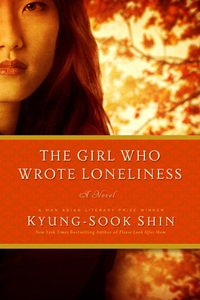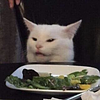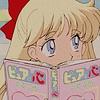You need to sign in or sign up before continuing.
Take a photo of a barcode or cover
I picked this book off my shelf, where it's been for quite some time; one of those books that you're not sure where it came from or what it's doing in your house, but it's there. And I'm neither thrilled nor upset that I read it. It was an interesting read, going into the life of a young girl/teenager in Korea in the late 1970s and 80s. I really know nothing about that time period, so it was educational as it referenced many events and places that I had never heard of before.
However, I found the style a bit discerning. The constant flipping to present and past within pages and paragraphs was a little much. I tend to like more linear stories, but this was well done. I also prefer less musings and more action/dialogue and this work focused more on the former. Overall, solid historical fiction (or fact/fiction, as the author writes it).
However, I found the style a bit discerning. The constant flipping to present and past within pages and paragraphs was a little much. I tend to like more linear stories, but this was well done. I also prefer less musings and more action/dialogue and this work focused more on the former. Overall, solid historical fiction (or fact/fiction, as the author writes it).
dark
emotional
mysterious
reflective
slow-paced
Plot or Character Driven:
Character
Strong character development:
Yes
Loveable characters:
Complicated
Diverse cast of characters:
Yes
Flaws of characters a main focus:
Yes
ماكنت أعرف إنها سيرة ذاتية بشكل رواية ، ع حسب كلام الكاتبة إن أحداثها مابين الحقيقة و الخيال ، وهي تتكلم عن أمها يجي على بالي روايتها (أرجوك أعتن بأمي) أحس الجزء اللي يخصها في الكتابين حقيقة :(
My second novel by another novelist from South Korea -- again, a dark experience, but more accessible to readers unfamiliar with the history of that country.
I wanted to like this more, because it has some genuinely lovely writing that neither the bleak subject matter—a writer's chronicle of her teenage self's attempt to escape working class poverty—nor the clumsy editing errors littering my edition could obfuscate. Instead, I ended up loving individual passages without ever feeling any particular investment in the characters and plot.
I'm going to blame my lack of context.
The novel tells a very personal story, one inextricable from a particular point in history. Arguably that history is as much a character as Shin's unnamed narrator, if not more so, given the imprint it left on her. The story artfully weaves back and forth between the grim past and the long shadows it still casts on the narrator's present, but it's the history that drives it, not the people.
Not knowing that history, its referents, made this an occasionally opaque read, a lot like stumbling across information you recognize as relevant, but without knowing how or why. Let's just say I spent a lot of time on Wikipedia getting a crash course in late 20th century South Korean history while reading this. The narrative came together better after that, but its flow was broken. It's not a complaint, or a criticism. It does, however, explain my distance from the text.
I'm going to blame my lack of context.
The novel tells a very personal story, one inextricable from a particular point in history. Arguably that history is as much a character as Shin's unnamed narrator, if not more so, given the imprint it left on her. The story artfully weaves back and forth between the grim past and the long shadows it still casts on the narrator's present, but it's the history that drives it, not the people.
Not knowing that history, its referents, made this an occasionally opaque read, a lot like stumbling across information you recognize as relevant, but without knowing how or why. Let's just say I spent a lot of time on Wikipedia getting a crash course in late 20th century South Korean history while reading this. The narrative came together better after that, but its flow was broken. It's not a complaint, or a criticism. It does, however, explain my distance from the text.
I both liked the way this book was written and felt overwhelmed by it. It's a quiet book, but it also felt slippery like I couldn't completely get a hold on the story, or the characters. I'm not sure that made sense. Something about this book fascinates me, but also I longed to finish it often when I was reading. I'll certainly be reading other books by this author.
Also this is irrelevant, but it's bothering me because I can't find mention of it, but the main character seemed to be queer? At one point in a section set in present day, she mentions reading the paper in bed and a woman referred to as "H" is sleeping... presumably next to her. I guess it could just be a friend.......... I don't know. The only other time I remember H being mentioned is close to the end when the protagonist calls some people on the phone. Also I could read her relationship with Hui-jae as being queer-coded. But anyway. That's all conjecture. Maybe I should take my gay goggles off. (Ha. As if that's even possible.)
Also this is irrelevant, but it's bothering me because I can't find mention of it, but the main character seemed to be queer? At one point in a section set in present day, she mentions reading the paper in bed and a woman referred to as "H" is sleeping... presumably next to her. I guess it could just be a friend.......... I don't know. The only other time I remember H being mentioned is close to the end when the protagonist calls some people on the phone. Also I could read her relationship with Hui-jae as being queer-coded. But anyway. That's all conjecture. Maybe I should take my gay goggles off. (Ha. As if that's even possible.)
dark
emotional
informative
inspiring
reflective
sad
medium-paced
Plot or Character Driven:
Character
Strong character development:
Yes
Loveable characters:
Yes
Diverse cast of characters:
Yes
Flaws of characters a main focus:
Yes
dark
emotional
sad
slow-paced
Plot or Character Driven:
Character
Strong character development:
Yes
Loveable characters:
Yes
Diverse cast of characters:
Yes
Flaws of characters a main focus:
Yes
okay, I wasn’t expecting this to read like random trains of thoughts......
First of all, I like that this gives insight to a particular bit of history that I’ve never heard of before. The factory girls and the special program for their education is interesting and I wish the story could have focused more on that. Perhaps I was wrong in expecting a story when really this is a somewhat autobiographical memoir. It’s more of a recollection of things that the author has went through imo.
Secondly, the writing is lovely. Kudos to both the original writer and the translator for that. It is slightly confusing though since the tenses are the same but the author will jump from present (where the narrator is 32) to the past (where the narrator is 16) without much fanfare.
I’m no expert at analysing literature and much of my reviews rely on me enjoying the story or not. In this case, it’s a bit too meandering for me. I just prefer my reading material to be simple 🙈 however, I did and probably always will enjoy the way Kyung Sook describes Korea.
First of all, I like that this gives insight to a particular bit of history that I’ve never heard of before. The factory girls and the special program for their education is interesting and I wish the story could have focused more on that. Perhaps I was wrong in expecting a story when really this is a somewhat autobiographical memoir. It’s more of a recollection of things that the author has went through imo.
Secondly, the writing is lovely. Kudos to both the original writer and the translator for that. It is slightly confusing though since the tenses are the same but the author will jump from present (where the narrator is 32) to the past (where the narrator is 16) without much fanfare.
I’m no expert at analysing literature and much of my reviews rely on me enjoying the story or not. In this case, it’s a bit too meandering for me. I just prefer my reading material to be simple 🙈 however, I did and probably always will enjoy the way Kyung Sook describes Korea.





